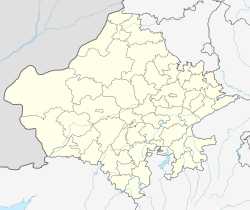Chittore
|
Chittorgarh चित्तौड़गढ़ |
|
|---|---|
| city | |
| Location in Rajasthan, India | |
| Coordinates: 24°53′N 74°38′E / 24.88°N 74.63°ECoordinates: 24°53′N 74°38′E / 24.88°N 74.63°E | |
| Country |
|
| State | Rajasthan |
| District | Chittorgarh |
| Founded by | Chitrangada Mori |
| Named for | Chitrangada Mori |
| Government | |
| • Body | Chittorgarh Municipal Council |
| Area | |
| • Total | 28 km2 (11 sq mi) |
| Elevation | 394.6 m (1,294.6 ft) |
| Population (2011) | |
| • Total | 184,439 |
| • Rank | 121 |
| • Density | 6,600/km2 (17,000/sq mi) |
| Languages | |
| • Official | Hindi, English, Mewari |
| Time zone | IST (UTC+5:30) |
| PIN | 312001 |
| Area code(s) | +91-01472-XXXXXX |
| Vehicle registration | RJ-09 |
| Website | www |
| uitchittorgarh |
|
Chittorgarh (Hindi: चित्तौड़गढ़) ![]() pronunciation (also Chittor or Chittaurgarh) is a city and a municipality in Rajasthan state of western India. It lies on the Berach River, a tributary of the Banas, and is the administrative headquarters of Chittorgarh District and a former capital of the Sisodia Rajput Dynasty of Mewar. The city of Chittaurgarh is located on the banks of river Gambhiri and Berach. The district was bifurcated and a new district namely Pratap Garh was created with certain portion taken from Udaipur district in the newly created district of Pratap Garh.
pronunciation (also Chittor or Chittaurgarh) is a city and a municipality in Rajasthan state of western India. It lies on the Berach River, a tributary of the Banas, and is the administrative headquarters of Chittorgarh District and a former capital of the Sisodia Rajput Dynasty of Mewar. The city of Chittaurgarh is located on the banks of river Gambhiri and Berach. The district was bifurcated and a new district namely Pratap Garh was created with certain portion taken from Udaipur district in the newly created district of Pratap Garh.
Fiercely independent, the fort of Chittor was under siege thrice and each time they fought bravely, thrice Jauhar was committed by the ladies and children. The sacrifice of Rao Jaimal and Patta, two brave army chieftains of Mewar, in the war against the Mughals (1568 AD) was so great that the Mughal Emperor Akbar installed their statues in the fort of Agra. It has also been a land of worship for Meera. Chittorgarh is home to the Chittorgarh Fort, the largest fort in India and Asia.
It was named Chitrakut after Chitrangada Mori, a Rajput chieftain as inscribed on ancient Mewari coins. The fort is surrounded by a circular wall which has seven huge gates before one can enter the main fort area. Some accounts say that the Mori dynasty was in possession of the fort when Bappa Rawal the founder of the kingdom of Mewar seized Chittor garh (Chittor fort) and made it his capital in 734 AD. Some other accounts say Bappa Rawal received it as a part of the dowry after marriage with the last Solanki princess. After that date his descendants ruled Mewar, which stretched from Gujarat to Ajmer, until the 16th century. Chittor was one of the most contested seats of power in India with probably some of the most glorious battles being fought over its possession. It is famous in the annals of the Mewar Dynasty as its first capital (prior to this, the Guhilots, forerunners of the Mewar Dynasty, ruled from Idar, Bhomat, and Nagda), and renowned in India's long struggle for freedom. By tradition, it remained the Mewar capital for 834 years. With only brief interruptions, the fort has always remained in possession of the Sisodias of the Guhilot (or Gehlot/Guhila) clan of Rajputs, who descended from Bappa Rawal.
...
Wikipedia

